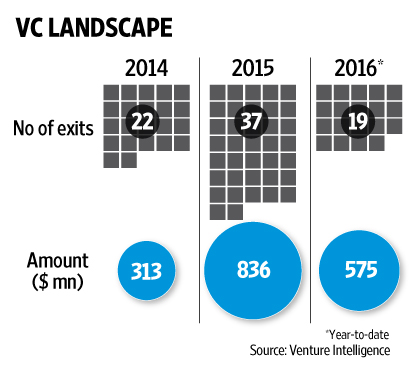Most Internet companies in India are yet to show profits, which rules out public markets listing as an exit route for investors.
Mumbai: Last week, online travel agency Yatra Online agreed to a reverse merger with Terrapin 3 Acquisition Corp. in a multi-phased transaction that assigned it an enterprise value of $218 million.
The transaction provided a partial exit to a clutch of venture capital investors, including Norwest Venture Partners (NVP), Reliance Venture Asset Management Ltd, IDG Ventures, Valiant Capital, Vertex Ventures and Intel Capital that have invested in the company over the past 10 years. NVP, Yatra’s earliest backer, first invested in the company in 2006.
Also last week, Tata group company Titan Co. Ltd announced that it has signed a share purchase agreement to acquire a 62% stake in online jewellery retailer CaratLane Trading Pvt. Ltd for Rs.357.2 crore (approximately $53 million), thus providing an exit to venture capital investor Tiger Global Management Llc.
There have been 19 exists till date this year, data from Venture Intelligence shows, and, expectedly, the conversation has shifted to whether venture capitalists (VCs) invested in India are seeing their first real exit season. The answer is no.
Industry experts say that problems remain as the ecosystem is still young and evolving.
“The exit scenario is still not that great. India is still a very young market compared to other developed venture markets in the west. Hence, in India the exit horizons will tend to be long,” said Farooq Oomerbhoy, founder of FAO Ventures and former co-founder of Orios Venture Partners.
Most Internet companies in India are yet to show profits (many don’t even have a path to profitability), which rules out a public market listing as an exit route for investors.
“To get to initial public offering (IPO) stage will still take some time, especially since Indian markets require you to be very profitable and not many companies from here can go public on Nasdaq,” said Satish Andra, founder and managing director of early-stage venture capital fund Endiya Partners.
India has seen just a couple of Internet companies go public so far such as Info Edge (India) Ltd and Just Dial Ltd, on local exchanges, and MakeMyTrip Ltd, on Nasdaq.
In March, Infibeam Incorporation Ltd, which runs an e-commerce platform, went public on Indian stock exchanges, raising Rs.450 crore through its IPO.
In contrast, in 2015 alone, the US saw 28 tech IPOs.
The lack of IPOs in the Indian market leaves mergers and acquisitions (M&As) as the only viable exit route for VCs invested in India. But even on that front experts say that things are not too encouraging.
“If you look at the most active tech markets, US and Israel, the proportion of VC (venture capital) investment to M&A in any given year is roughly 4:1 or 5:1. For every 1 billion going into companies as an investment, the M&A pool is about $4-5 billion dollars. This provides enough liquidity and returns for the VC investors,” said Nitin Bhatia, managing director at technology-focused investment banking firm Signal Hill.
However, in India we are a little shy of 1x when it comes to M&A exits for every $1 billion of venture capital investments, he said. “So there is not enough liquidity getting created through M&A in India. Unless that gets addressed there will be some problems on the exit front,” added Bhatia.
Venture capital firms believe that the situation should improve in the next six to 12 months.
“From a global perspective, everyone is now eyeing India. People feel that now is the right time to invest in India, as they feel that the Indian tech market is in a similar position that the China market was in around 10 years ago when tech investments really took off. A lot of fresh capital with strategic intent is sitting on the fence,” said Vikram Gupta, founder and managing director, IvyCap Ventures Advisors Pvt. Ltd.
From 2017 onwards, we should start seeing major action in terms of M&A, he added. “Exits will be driven by large strategic investments from the US and China.”
Indeed, while large Chinese Internet companies such as Alibaba, Tencent and Baidu have already made investments in India, they are yet to make large acquisitions and have so far been involved in picking up minority stakes in Indian start-ups.
According to Gautam Patel, managing director at Mumbai-based tech-focused private equity fund, Zodius Capital, global sovereign funds and strategic investors are keen on investing in businesses operating in large, addressable markets that have a proven opportunity.
“In verticals such as apparel, grocery, and furniture, where the addressable market is big”, investors are already making a beeline to India, Patel added.
Source: Mint
